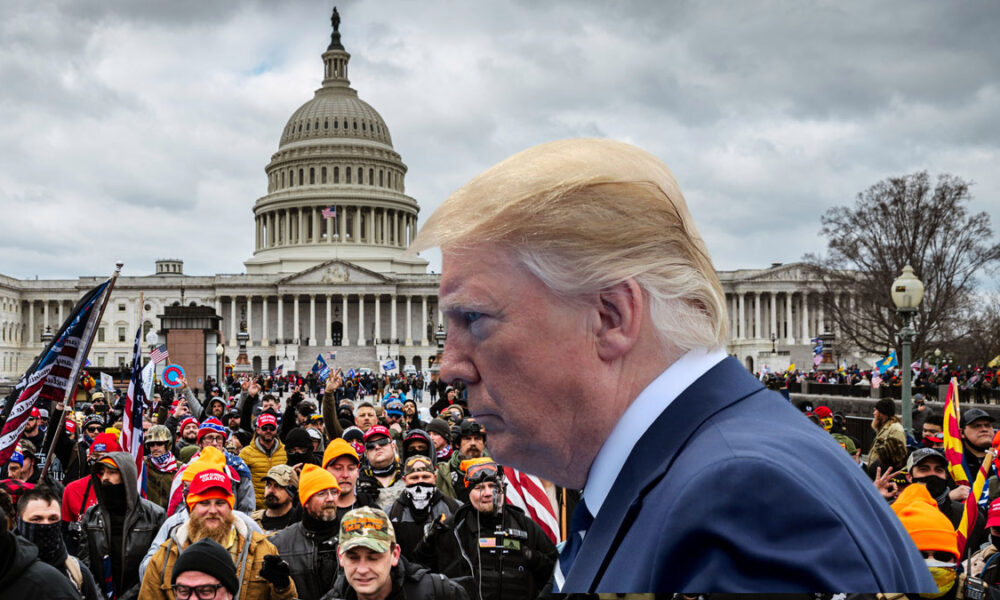From Cuban exiles to North Korean refugees, Chinese Christians to Iranian feminists, young protest leaders in Hong Kong to senior elected officials in Venezuela, pro-democracy forces from all around the world have found themselves partnered with Trump.
But as the president’s term comes to an end amid unfounded claims of a stolen election, the violent storming of the U.S. Capitol and a second vote to impeachment him in the House, these liberal forces find themselves in an illiberal partnership with far-right militias, QAnon conspiracy theorists and America’s very own strongman leader.
Some have embraced Trump’s message. Over the last few months, China-watchers have noted that a number of U.S.-based human rights activists, such as the “barefoot” lawyer Chen Guangcheng, who was welcomed as a refugee during the Obama administration, have promoted unfounded pro-Trump theories of electoral fraud.
Bob Fu, the leader of the human rights group ChinaAid and a friend of Chen’s, told Today’s WorldView he attended the rally outside the White House on Jan. 6 and marched to the Capitol. Fu, who said he was in town for a White House tour and did not witness violence firsthand, noted that it reminded him of his time protesting in Beijing in 1989.
“Thirty years ago, I was at Tiananmen Square fighting for freedom, democracy in China. Now, 30 years later, I’m at the National Mall calling for a fair election,” Fu said. “When the violence erupted, it was kind of like a little second Tiananmen Square, but smaller-scale and less dramatic.”
Fu said he believed Chen, whom he helped escape from China, was in downtown Washington the same day, but they did not meet. Chen’s assistant did not respond to a request for an interview. The activist has tweeted pro-Trump messages since Jan. 6.
Many activists and dissidents have recognized the uncomfortable position the Capitol protests put them in. Some Cuban exiles downplayed it, suggesting that the violence was comparable to Black Lives Matter protests and promoting unfounded theories that antifa had infiltrated the protests.
“I believe that the last few months under the terror of Black Lives Matter and antifa has been the saddest period of time in the U.S.” Alexander Otaola, a Miami-based activist and prominent Trump supporter, said in a Spanish-language YouTube program after the riots, according to the Miami Herald.
Ahmad Batebi, a former Iranian student who became a symbol of the country’s 1999 protest movement after being photographed holding a bloodstained shirt, has used Twitter to call Ashli Babbitt, a Trump supporter shot dead during the riot at the Capitol, a “patriot” and share praise for lawmakers who disputed the electoral college count.
In an interview, Batebi said he would probably have attended the White House rally if he were in Washington and that he believed President-elect Joe Biden’s win in the U.S. election was fraudulent. “I personally love Trump and I strongly believe he is a patriot,” he said.
Batebi also emphasized that he had been saddened by the violent scenes in Washington, and he directed blame toward Trump himself. “Bringing people out to the street without any organization? That was really bad,” said Batebi, who has lived in the United States since 2008.
A number of Trump-backed democracy movements have openly distanced themselves from the protests. Juan Guaidó, the Venezuelan opposition figure who had Trump’s backing in his claims to the country’s presidency, tweeted that the attack on the Capitol was an attack on democracy itself. Another activist, Jorge Barragán, said the scenes in Washington had “made everything more difficult for us.”
Nathan Law, a pro-democracy activist from Hong Kong who was invited to the State of the Union last year as a guest of Trump ally Sen. Rick Scott (R-Fla), also pushed back on the idea that the Washington riot had any similarity with his own movement, saying Hong Kong protesters were “civilized and well-mannered” and fighting for “social justice.”
But Trump was a problematic ally for many activists long before the siege. While some joined with him because of traditional religious values, or the influence of diaspora media, for most the alliance was far simpler: He supported their cause.
“For me, honestly, it’s not a big deal who is in power in America,” said Masih Alinejad, an Iranian women’s rights activist who now lives in New York and held a controversial meeting with Secretary of State Mike Pompeo in 2019. “The big deal is who should not be in power in Iran,” she said.
Alinejad said there were many Trump administration policies against Iran that she did not agree with, but on balance, she said she supported the increased use of sanctions and vocal condemnation of Iran.
Wang Dan, a student leader during the Tiananmen Square protests who lives in Bethesda, Md., and has been criticized for making pro-Trump statements, expressed a similar sentiment, explaining that he has supported “confrontation-oriented policies” by the Trump administration against China in recent years and the increased support for Taiwan.
In an email, Wang said he did “not support Trump as a person,” but wished that he had been reelected.
At the same time, Trump’s blustering diplomacy made him an unpredictable ally for many activists. Joseph Kim, an expert in residence at the George W. Bush Institute and a refugee to the United States, said North Korean human rights defenders were delighted when Trump focused on their cause during a visit to Seoul and invited defectors to his 2018 State of the Union address.
But when Trump later met with Kim Jong Un, he did not mention human rights at all. Recent events have tarnished the U.S. reputation, Kim suggested.
“Human rights and justice for others are what this nation has stood for [for] a long time and that’s what this country is respected for the most,” said Kim, who voted in his first U.S. election last year. “We have lost that at the moment, at least.”





